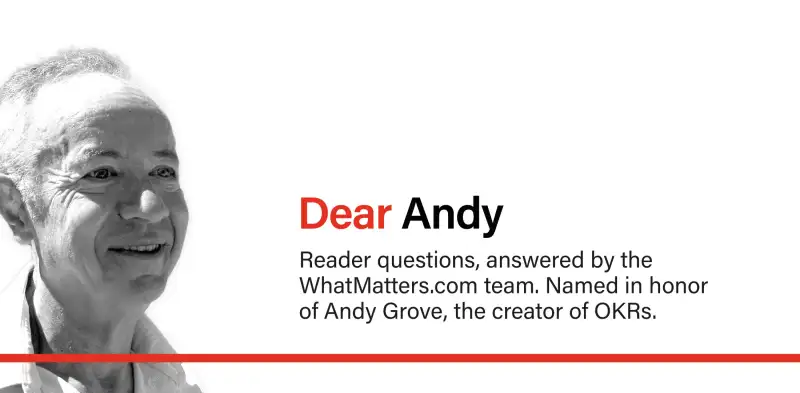Dear Andy,
What happens if a team fails to meet their OKRs? Do we set OKRs that require them to do less than what we originally requested, or do we try to find out where the bottlenecks are? Looking forward to hearing from you!
Best,
Atinuke

Hi Atinuke!
Thanks for writing in and for your great question.
Both of your suggestions are valid. And it all depends on what you learned in your self-assessment/reflection session and what type of OKR you’re setting.
If a team fails to meet their OKR, figure out where the bottlenecks are! Barring extraneous circumstances (the environment changes drastically, new sets of priorities are handed down from above, etc.), we recommend carrying the unachieved OKR into the next cycle and giving it another go.
Approach the new cycle by making adjustments based on what you learned. Start by asking, honestly, why you believe you failed to meet the OKR. Compare your answers with the group’s. Maybe new data showed that you were measuring the wrong thing and you need to adjust your KRs. If your KRs were spot on but you underestimated how much effort they would take, either recalibrate your plan or change the KR’s metric to be higher or lower. Maybe you’ve found the Objective isn’t a priority anymore (or possibly never even was), and you have room for a higher-priority KR. All are viable options. It’s the reflection and discussion that builds your team’s all-important “goal muscle.”
If the numbers you aimed for were unrealistically high, that’s great learning, too. Adjust them to be more realistically aggressive.
Committed OKRs should stretch your team to the edge of what it is capable of achieving. As Alphabet C.E.O. Sundar Pichai says in Measure What Matters, “As a leader, you must try to challenge the team without making them think the goal is unachievable.” If your predictions were unintentionally way off, adjust to more accurately capture what you need to do — and how much effort your team can undertake. Learning how far your team can stretch is extremely valuable information.
Which brings me to my next question. I’m interested to hear what your definition of “failure” is. If the OKR is aspirational, many teams find that reaching 70 percent of the goal is a success. If an OKR comes up short, but you learned something that can make the team better, you’ve succeeded.
As Rick Klau, a former partner at Google Ventures says, “You want your OKR system to make it easy to have focus and create an environment centering around experimenting and evolving.” Not every experiment will be a success. But all experiments can help us progress — if we can find the right takeaways. One of the best parts of OKRs is that “failure” is often expected and, in many cases, encouraged. We go into this topic a little more deeply near the end of a Dear Andy episode on our YouTube channel — keep an eye out for yours truly ;)
Thanks for writing in, Atinuke, and best of luck to you and your team on your OKR journey!
Sincerely,
Billy from the What Matters Team



